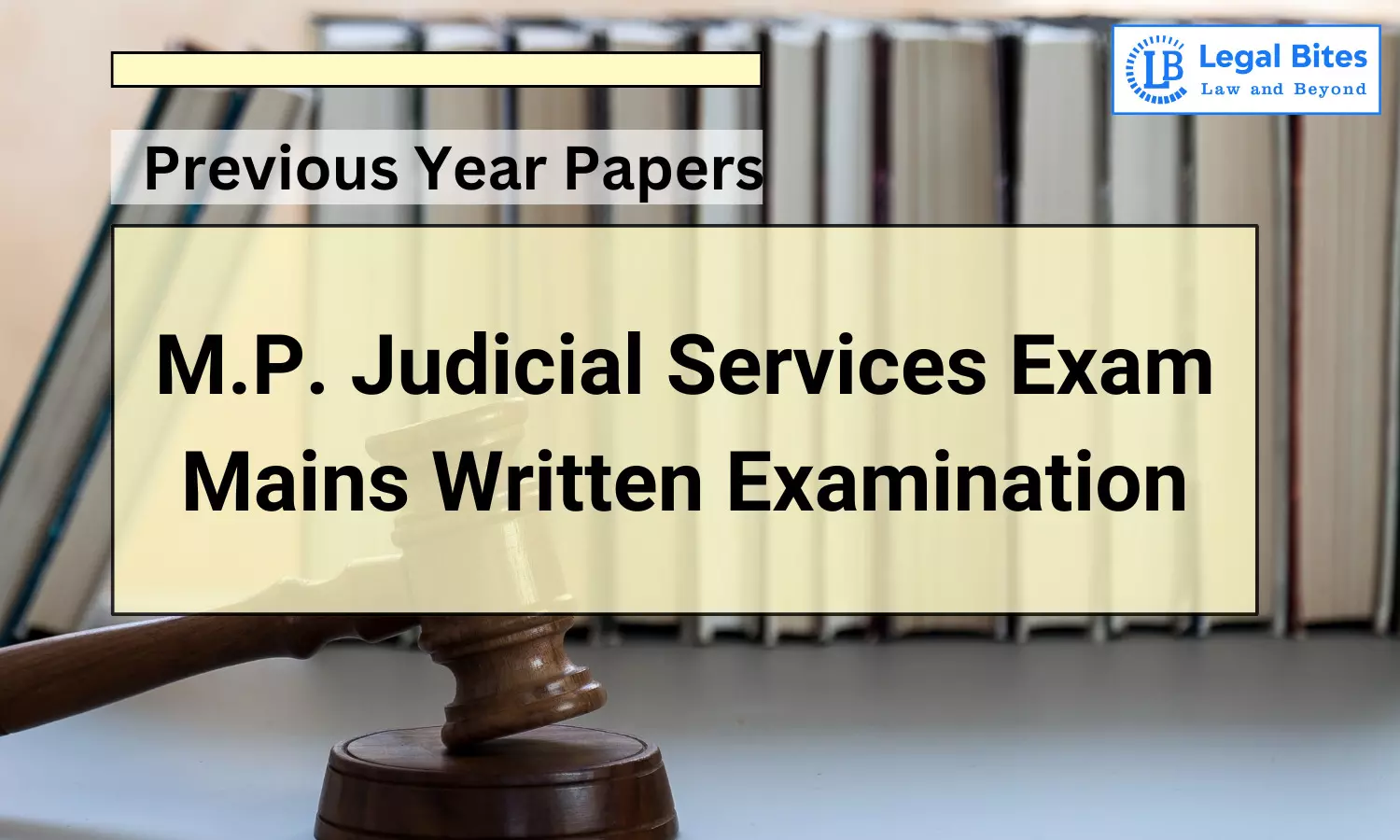M.P. Judicial Services Exam Mains 2021 Previous Year Paper III | Local Laws, Criminal Laws, and Procedure
Candidates preparing for MP Judicial Services should solve the M.P.(Madhya Pradesh) Judicial Services Mains 2021 Paper-III

Candidates preparing for M.P. Judicial Services should solve the M.P.(Madhya Pradesh) Judicial Services Mains 2021 Paper-III and other previous year question papers before they face Prelims and Mains.
Additionally, it gives an idea about the syllabus and the way to prepare the subjects by keeping the previous year's questions in mind. All toppers are mindful and cognizant of the types of questions asked by the MPCJ, to be aware of the different tricks and types of questions. This should be done by every aspirant when starting their preparation. It is very important to have an overall understanding of the pattern and design of questions.
Only practising original question papers will give you a real feel of the pattern and style of the questions. Here’s Madhya Pradesh Judicial Services Mains 2021 Previous Year Paper III (Local Laws, Criminal Laws, and Procedure).
M.P. Judicial Services (Civil Judge) Mains Examination 2021
PAPER III (Local Laws, Criminal Laws and Procedure)
Time: 3 Hours
Maximum Marks: 100
Instructions
- All questions are compulsory. Answer to all Questions must be given in one language either in Hindi or in English. In case of any ambiguity between English and Hindi version of the question, the English version shall prevail.
- Write your Roll No. in the space provided on the first page of Answer Book or Supplementary Sheet. Writing of his/her own Name or Roll No. or any Number or any mark of identification in any form in any place of the Answer Book not provided for, by which the Answer Book of a candidate may be distinguished/ identified from others, is strictly prohibited and shall, in addition to other grounds, entail cancellation of his/her candidature.
- Writing of all answers must be clear & legible. If the writing of Answer Book written by any candidate is not clear or is illegible in view of Valuer/Valuers then the valuation of such Answer Book may not be done.
M.P. Accommodation Act, 1961
Question 1
What are the restrictions on the eviction of tenants under Sec. 12 of the Madhya Pradesh Accommodation Control Act, 1961? Discuss. [8 Marks]
Question 2
Whether a widow can maintain a suit for eviction u/s 23 A (b) of M.P. Accommodation Control Act for her major sons? [4 Marks]
Question 3
(a) To which accommodations M.P. Accommodation Control Act, 1961 does not apply? [4 Marks]
(b) Define "Land Lord" and "tenant"?
M.P. Land Revenue Code, 1959
Question 4
Explain, state ownership in all lands and liability of land to payment of land revenue. Is there any exception to it? How is land revenue accessed? [8 Marks]
Question 5
Write a short note on “Service Land”? [4 Marks]
Question 6
What are the classes of “Revenue Officers”? [4 Marks]
Indian Evidence Act, 1872
Question 7
What is dying declaration? Discuss its evidentiary value. Whether an accused can be convicted only on the basis of dying declaration?
Question 8
What do you understand by Examination in chief, cross Examination and Re-Examination of witness? [4 Marks]
Question 9
How does the contents of electronic records may be proved and how it may be admitted in any proceedings? [4 Marks]
Indian Penal Code, 1860
Question 10
What is defamation? What are the essential ingredients to constitute the offence of defamation? Explain it's Exceptions. [8 Marks]
Question 11
Explain the ingredients of the offence of "Dishonest Misappropriation of property"? Distinguish it from "Criminal Breach of Trust". [4 Marks]
Question 12
What is abetment? How is it different from criminal conspiracy? [4 Marks]
Criminal Procedure Code, 1973
Question 13
(a) In what circumstances State government can file an appeal against acquittal in Sessions Court? [8 Marks]
(b) What are the powers of Magistrate to pass sentences?
(c) When an offender has been sentenced to pay fine and he makes default in making its payment then what action the court may take for its recovery?
(d) Whether Magistrate can commit the case to Court of Sessions after commencement of trial? Explain.
Question 14
Whether the right to "default bail" get extinguished by subsequent filing of charge-sheet by police? Explain through case law. [4 Marks]
Question 15
(a) Define 'Charge' and enumerate the contents of charge? Is a 'defective Charge' necessarily fatal to conviction? [4 Marks]
(b) Can a court alter the 'Charge'?
Negotiable Instruments Act, 1881
Question 16
What is the presumption in favour of holder of cheque and how can it be rebutted? [4 Marks]
Question 17
When Cognizance of offences can be taken under the Negotiable Instrument Act, 1881? Discuss the provision as to the Court within whose local jurisdiction, the offence under section 138 of Negotiable Instrument Act shall be inquired into and tried? [4 Marks]
Question 18
Write short notes on
(a) Doctrine of estoppel [4 Marks]
(b) Difference between “Investigation”, “Inquiry” and “Trial” [4 Marks]
(c) Vicarious Liability in criminal law [4 Marks]

